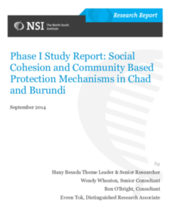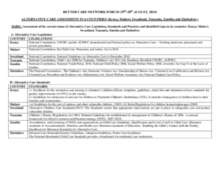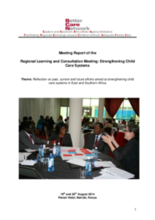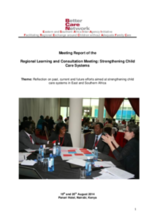Displaying 1211 - 1220 of 1617
UNICEF Somalia Office invites proposals from external universities to support the development of a programme and curriculum for Under-Graduate Diploma, a Bachelor of Social Work and a Post-Graduate Diploma in Social Work, in addition to capacity building of Faculty Staff, both academic and administrative.
This conference is being organised by leaders in the field: Keeping Children Safe, Plan International, Save the Children, Terre des Hommes, UNICEF Nigeria, USAID and War Child. Participation is sought from across Africa and from international experts.
This research explores links between child protection and peacebuilding. It includes a section examining community child protection mechanisms in Burundi.
The foundation is seeking to fund a cohort of partners in Shinyanga Region, Tanzania and in Zimbabwe in the following districts: Kadoma, Kwekwe, Gokwe North, Gokwe South, Nkayi, Lupane, Binga, and Hwange that are working on child rights, child protection, or activities that help build children’s emotional health.
This video features a segment of a talk on the effects of care environments on children, hosted by the Christian Alliance for Orphans. The key speakers featured include Dr. Kathryn Whetten & Dr. Charles Nelson, who discuss the Positive Outcomes for Orphans study (POFO) and the Bucharest Early Intervention Project (BEIP), respectively.
Assessment of the current status of Alternative Care Legislation, Standards and Practices and identified Gaps in six countries: Kenya, Malawi, Swaziland, Tanzania, Zambia and Zimbabwe.
Following a consultative mapping, a regional learning meeting took place on 19-20 August 2014 in Nairobi, Kenya. The theme of this meeting was "Reflection on past, current and future efforts aimed at strengthening child care systems in East and Southern Africa."
This report provides an overview of a two-day regional consultancy on strengthening child care systems in Eastern and Southern Africa.
The IATT CABA has commissioned a piece of work that seeks to identify approaches, interventions and tools that have effectively supported linkages between the child protection and HIV sectors, with a focus on three countries – Nigeria, Zambia and Zimbabwe – but featuring examples of promising practices or approaches from elsewhere.




